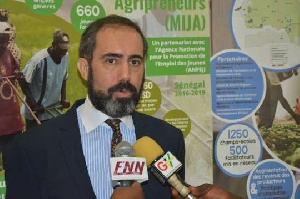There is the need to develop capacities of agricultural actors and intensify promotion of value chain development to address emerging challenges to food security, nutrition and sustainable rural development in West Africa.
Mr Serge Raymond Nakouzi, Deputy Food and Agriculture Organisation (FAO) Representative for Africa, has therefore stressed broad spectrum consultations among stakeholders in the agricultural sector to strengthen the resilience of the people in the sub-region and align goals on how they react to natural shocks, civil unrests, market price fluctuation, deteriorating terms of trade and new pests and diseases.
Mr Nakouzi was speaking on behalf of Mr Bukar Tijani, FAO Assistant Director General of FAO and Representative for Africa Region at the opening of a three-day West Africa 10th Multidisciplinary Team meeting, which began in Accra, Ghana, on Tuesday.
He said the alignment of goals at various levels among agricultural actors, coupled with immediate and sustained assistance, are necessary to achieve the Sustainable Development Goals (SDG).
“These would also save lives, protect livelihoods, prevent loss of assets and reduce acute malnutrition.”
Mr Nakouzi said interventions to support the resilience of people facing acute food insecurity are needed in order to avoid worsening the situation.
The meeting, which is on the theme “Achieving sustainable rural development, food security and nutrition in West Africa: tackling emerging challenges,” is between the FAO and its strategic partners to deliberate on Strengthening Social Protection for Improving Food Security and Nutrition in the sub-region.
It is an annual event between FAO and its strategic partners to dialogue, exchange information and knowledge as well as deliberate on pertinent development and partnership issues related to the FAO work in West Africa, both at national and supra-national.
Data available indicate that despite governments and partners efforts, the food security and nutrition situation is still alarming in the Lake Chad Basin (Niger-Nigeria-Chad) and in the north of Mali, where five million people are classified in Crisis, Emergency and Famine.
Also, although food availability is generally satisfactory, civil unrest is the main cause of livelihoods disruption and severe food insecurity in the sub region.
Moreover, households’ access to food is limited by the seasonal increase of market prices and deterioration of the terms of trade between livestock and cereal, coupled with the currency depreciation, particularly in Nigeria, Liberia, Sierra Leone and Ghana.
“In the above-mentioned countries, immediate and sustained assistance is needed to save lives, protect livelihoods as well as prevent loss of assets and reduce acute malnutrition,” Mr Nakouzi said, adding that, insecurity due to armed groups, sporadic clashes between crop farmers and pastoralists over limited natural resources are becoming a growing concern in some countries of the sub-region.
On the other hand, the invasive Fall Armyworm (Spodoptera frugiperda) is causing extensive damage to crops mainly maize in many countries of West Africa since 2016. Likewise, despite many efforts of FAO, its partners and member states, the threat posed by the two sub types of Highly Pathogenic Avian Influenza (H5N1 and H5N8), particularly in Nigeria, is a cause for concern.
More recently, a Low Pathogenic Avian Influenza outbreak was recorded in Burkina Faso. These and other emerging challenges, are posing formidable challenges to rural development, food security and nutrition in the West African sub-region.
Mr Nakouzi recalled that partnership agreements between the FAO and some of its collaborators have since November 2012 foster the inclusiveness, coordination and harmonization of their respective development actions, with mutual commitments to regular consultations on key matters regarding agriculture, food security and nutrition and improved participation on key events of one another.
They also focus on strengthened dialogue, cooperation and coordination with ECOWAS and other regional technical institutions and resources partners, timely identification and planning of capacity development assistance as well as knowledge and information management and sharing.
In this regards, FAO provided technical assistance to ECOWAS and the 15 member States in West Africa in the implementation and assessment of the first generation of the ECOWAS regional agriculture policy (ECOWAP) and investment plans at both regional (RAIP) and country level (NAIP).
Furthermore, FAO played an important role in the domestication of the global and continental declarations and commitments, which include: i) the 2014 Malabo Declaration on Accelerated Agricultural Growth and Transformation for Shared Prosperity and Improved Livelihoods, the Agenda 2030, the International Conference on Nutrition (ICN2).
Also the Conference of Parties (COP 21 & 22), the United Nations Gender agenda, (ii) the preparation, formulation and adoption of the 2nd generation of ECOWAP/RAIP and the Monitoring and Evaluation framework and mechanism adopted by the West African Regional Ministerial Conference of December 2016, as well as the on-going support to the 15 member countries for the formulation and implementation of their national agricultural, food security and nutrition investment plans (NAFSIP).
During the next decade, in line with the lessons learned from the regional conference of ECOWAP+10 of November 2015 and the orientations stipulated in the renewed ECOWAS compact, FAO role and technical support to regional institutions and member States are expected to grow in scope and partnership diversity and to gain in streamlining the West Africa sub-regional and member country needs of technical assistance through the FAO strategic programs and regional initiatives.
Participants were drawn from the Food and Agriculture Organization (FAO); Regional Economic Commission and Sub regional Organizations, Development Partners, other UN Agencies, sub regional farmer and civil society organizations and private sectors actors.
The 10th West Africa MDT comes as a timely opportunity for FAO, ECOWAS and other sub-regional stakeholders to strategically and proactively set the stage for their collaboration in order to achieve the development goals and targets in West Africa, in the face of persisting and/or emerging challenges.
General News of Wednesday, 25 October 2017
Source: ghananewsagency.org

















